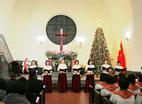"Are you a Christian?" After a Sunday service at a seminary, a girl with a shy smile greeted me. The girl, named Xiaoli, shared her life experience and faith journey. She mentioned that, with a teenage son and a faith from birth, she regularly attended services at the seminary and had completed systematic theology courses. After the COVID-19 pandemic, she became eager to understand the Bible, particularly the Book of Revelation. For some time, she listened to the teachings of many renowned pastors.
"Listening to their teachings gives me a lot of strength, like a shot of adrenaline," Xiaoli said. "But usually, the sermons are fragmented, so I want to learn systematically." She said that she met a seminary student during previous services and told her about a one-year systematic Bible course in addition to the seminary's regular full-time courses. The course is divided into beginner, intermediate, and advanced levels. There are no educational requirements and no need for recommendations from the church in one's hometown, so every believer has the opportunity to study theology systematically.
I consulted with a seminary teacher afterward, who said the school did not offer any so-called theology courses at three levels. Combined with reports from other believers and my experiences, I confirmed that Xiaoli was a member of the Korean Shinchonji Cult.
Based on this experience and observations from my past visits, I believe the church should take the following seven approaches to improve resistance to heresies:
Pastors need to recognize the heresy to protect God's flock.
Pastors must be aware that heretical cults are not regional or confined to specific locations. Cults like Shinchonji, the Bloody Holy Spirit, and the Eastern Lightning are infiltrating churches and capturing the flock actively and systemically. Shinchonji has announced a nationwide preaching strategy. In the southeast, they distribute flyers outside churches and engage believers one-on-one; in the northwest, they target members of CC&TSPMs; in the northeast, they exploit brainwashed pastors to take over entire churches; and in the southwest, they distribute publications to believers' homes. They divide tasks among individuals who are responsible for some areas, set daily preaching targets, and evaluate results with rewards and penalties.
Promote awareness of heretical characteristics and disclose heretical elements with strong measures
The reason I recognize that Xiaoli might be a cult member is that Shinchonji features three levels of courses: beginner, intermediate, and advanced. A church in Guangdong held a series of lectures on resisting heretical doctrines, and a church in Hunan collaborated with universities to educate both believers and non-believers about the characteristics of cults. Some churches established befriend ministry to answer believers’ questions about heresy. Additionally, two churches in Ningbo collected the WeChat contacts of Shinchonji members and published articles and image collections, exposing these heretical elements in church groups, WeChat public accounts, and websites.
Teach believers the correct perspective on the church and pastors.
To lure people away, heresies criticize churches for lacking truth or compassion. Some believers turn to heresies when they become disappointed with their churches, which have shortcomings. Churches should teach believers that the church is a community of sinners and that there are no perfect churches or saint-like shepherds. Churches should remind believers to unite with the church and shepherds when they discover problems by praying, communicating, and solving issues instead of blaming and distancing themselves.
Pay attention to isolated believers.
Xiaoli approached me when I was alone at that time. Those who have not yet formed relationships with other believers or been committed to the church can be their targets. For newcomers to the church, follow-up care is necessary, and a complementary nurturing system and group life can be even more effective. For mobile believers, many churches start to accept them with pastoral care, and for those leaving, churches in their new location are recommended.
Meet believers' needs in sound doctrine.
Dr. Luo from the Institute of Religious Studies, Shanghai Academy of Social Sciences, noted that many believers, especially young people, leave their church and join heresies due to the lack of systematic biblical teaching. Churches should provide systematic training and correct biblical knowledge for believers at different stages of spiritual life. Additionally, churches can give attention to believers’ overall well-being and provide what they need, such as teachings on mental health, parent-child relationships, and marital relationships. During my visits, I found that many churches had already established progressive discipleship training systems.
Do not avoid teaching the Book of Revelation.
Heresies like Shinchonji claim to be able to interpret Revelation, based on which they establish eschatology and create a sense of urgency about the end times to pressure believers to join the "One True Church" to be saved. Churches should accept the challenge and not shy away from Revelation, offering correct interpretations of the book for believers.
Beware of cults’ online preaching and utilize the digital space.
According to reports, Shinchonji preaches on diverse social media platforms like Xiaohongshu, Douyin (TikTok), Sina Weibo, WeChat, games, and dating apps. They also adopt forms such as biblical art, psychological tests, surveys, community lectures, and Bible studies.
The head of a church council in a town in southeast China mentioned in a report at the believers' conference that the church needs to learn and master online and AI technology. He stated that in the information age, the external environment has shifted from two-dimensional to three-dimensional. The task that God has given to the church in this era is to change the virtual environment, or online environment. The church needs to learn how to gather resources for believers; if it cannot become a provider of high-quality online resources, it can at least filter the information and facilitate the information transmission.
- Translated by Abigail Wu












